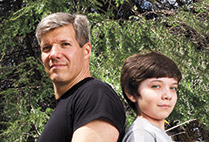For more than a year, Tom Lyons has been planning with the precision of a field general: hiring a consultant and holding weekly meetings. The issue? How to move and recategorize more than a million books. Lyons describes the now nearly completed project as “organized chaos.”
In November 2011, the former insurance executive bought New England Mobile Book Fair (NEMBF), the largest independent bookstore in New England. From the parking lot, the squat cinderblock building nestled in a commercial strip in Newton Highlands, Mass., looks unremarkable. But step inside to a bibliophile’s dream. Its 32,000 square feet (more warehouse than shop around the corner) is piled floor to ceiling with books: classics, best sellers, remainders, and picture books.
NEMBF, which is neither mobile nor a fair, is so named because the first lot of books was bought from a woman who sold the volumes out of her car at school book fairs. With the books came the name, and it stuck. More than half a century later, the store still offers discounts to schools and libraries, and the less-than-accurate name has long been just one of the store’s endearing peculiarities. Until recently, all of the books (yes, one million plus) were arranged by publisher rather than by genre, as is done in the vast majority of bookstores.
When he bought the store, Lyons (MET’76) decided he’d have to make changes, starting with moving and reshelving miles of books. The staff had to create staging areas, where they could sort the books into categories: fiction versus nonfiction, and then major areas of fiction, such as mysteries. Nonfiction had many smaller categories—biography, history, poetry, gardening, and art and photography, among others. And that meant many of the books had to be moved more than once.
Now 68, Lyons started his latest business venture at an age when many of his colleagues have retired. For decades he worked for companies like AIG, Wang, and Oracle, where he directed marketing for insurance. He later became an independent business consultant, advising insurance companies.
Lyons is well aware of the challenges he faces. Across the country, venerable indies such as Wordsworth, in Cambridge, Mass., Dutton’s Brentwood Books, in Los Angeles, and Gotham Book Mart and Coliseum Books, in New York, have been shuttered, in large part because of the steeply discounted prices offered by Amazon.com and Walmart and the advent of e-readers.
But he points to an optimistic trend during the last couple of years. The American Booksellers Association, the national trade group for independent bookstores, reports that the number of independent bookstores actually has risen, from 1,651 in 2009 to 1,900 last year. “I just felt, yes, I can do this,” says Lyons. He hopes NEMBF will begin turning a profit by 2014.
Since he’s become owner, Lyons has done much more than reorganize the books. A newly designed website has allowed customers to order books online for the first time, and it’s now possible to order e-books online, as well as e-readers by Kobo. Lyons estimates that the store has increased its nonbook merchandise by more than 200 percent in the last year, which is critical to the success of an independent bookstore.
NEMBF has also launched an ambitious series of author readings, workshops, and special events. And the store has rebuilt its business selling books to local schools and libraries, which accounts for between 10 and 20 percent of its business. What hasn’t changed, says Lyons, is the store’s customer service—what he calls its secret weapon. Each of the nearly three dozen employees stayed on after he bought the place. “I love books, but I don’t know books the way they do,” he says.
Lyons says the experience has been rewarding. “People ask me, ‘Are you having fun?’ Yes, I am having a ball,” he says. “It’s a hell of a ride. It really is.”
















































Nice article, Got a new idea from it.
Everyone desires to win the lottery, however, most of us tend not to even possess a single lucky number on our ticket. So how does one improve your probability of winning? Well most likely it occurs by mere probability. The more tickets you buy for a particular drawing, the more likely your chances. But there are some folks that think there exists more to it than that.